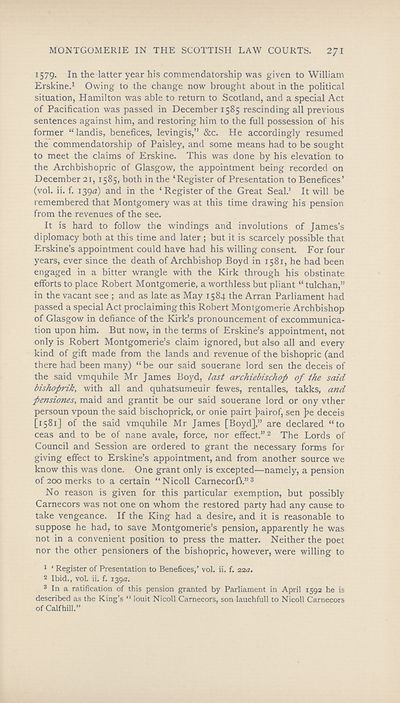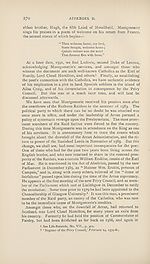Download files
Complete book:
Individual page:
Thumbnail gallery: Grid view | List view

MONTGOMERIE IN THE SCOTTISH LAW COURTS. 271
1579. In the latter year his commendatorship was given to William
Erskine.1 Owing to the change now brought about in the political
situation, Hamilton was able to return to Scotland, and a special Act
of Pacification was passed in December 1585 rescinding all previous
sentences against him, and restoring him to the full possession of his
former “landis, benefices, levingis,” &c. He accordingly resumed
the commendatorship of Paisley, and some means had to be sought
to meet the claims of Erskine. This was done by his elevation to
the Archbishopric of Glasgow, the appointment being recorded on
December 21, 1585, both in the ‘Register of Presentation to Benefices’
(vol. ii. f. 139a) and in the ‘ Register of the Great Seal.’ It will be
remembered that Montgomery was at this time drawing his pension
from the revenues of the see.
It is hard to follow the windings and involutions of James’s
diplomacy both at this time and later ; but it is scarcely possible that
Erskine’s appointment could have had his willing consent. For four
years, ever since the death of Archbishop Boyd in 1581, he had been
engaged in a bitter wrangle with the Kirk through his obstinate
efforts to place Robert Montgomerie, a worthless but pliant “ tulchan,”
in the vacant see ; and as late as May 1584 the Arran Parliament had
passed a special Act proclaiming this Robert Montgomerie Archbishop
of Glasgow in defiance of the Kirk’s pronouncement of excommunica¬
tion upon him. But now, in the terms of Erskine’s appointment, not
only is Robert Montgomerie’s claim ignored, but also all and every
kind of gift made from the lands and revenue of the bishopric (and
there had been many) “be our said souerane lord sen the deceis of
the said vmquhile Mr James Boyd, last archiebischop of the said
bishoprik, with all and quhatsumeuir fewes, rentalles, takks, and
pensiones, maid and grantit be our said souerane lord or ony vther
persoun vpoun the said bischoprick, or onie pairt Jjairof, sen J>e deceis
[1581] of the said vmquhile Mr James [Boyd],” are declared “to
ceas and to be of nane avale, force, nor effect.”2 The Lords of
Council and Session are ordered to grant the necessary forms for
giving effect to Erskine’s appointment, and from another source we
know this was done. One grant only is excepted—namely, a pension
of 200 merks to a certain “Nicoll CarnecorD.”3
No reason is given for this particular exemption, but possibly
Carnecors was not one on whom the restored party had any cause to
take vengeance. If the King had a desire, and it is reasonable to
suppose he had, to save Montgomerie’s pension, apparently he was
not in a convenient position to press the matter. Neither the poet
nor the other pensioners of the bishopric, however, were willing to
1 ‘ Register of Presentation to Benefices,’ vol. ii. f. 22<7.
2 Ibid., vol. ii. f. 139a.
3 In a ratification of this pension granted by Parliament in April 1592 he is
described as the King’s “ louit Nicoll Carnecors, son lauchfull to Nicoll Carnecors
of Calf hill.”
1579. In the latter year his commendatorship was given to William
Erskine.1 Owing to the change now brought about in the political
situation, Hamilton was able to return to Scotland, and a special Act
of Pacification was passed in December 1585 rescinding all previous
sentences against him, and restoring him to the full possession of his
former “landis, benefices, levingis,” &c. He accordingly resumed
the commendatorship of Paisley, and some means had to be sought
to meet the claims of Erskine. This was done by his elevation to
the Archbishopric of Glasgow, the appointment being recorded on
December 21, 1585, both in the ‘Register of Presentation to Benefices’
(vol. ii. f. 139a) and in the ‘ Register of the Great Seal.’ It will be
remembered that Montgomery was at this time drawing his pension
from the revenues of the see.
It is hard to follow the windings and involutions of James’s
diplomacy both at this time and later ; but it is scarcely possible that
Erskine’s appointment could have had his willing consent. For four
years, ever since the death of Archbishop Boyd in 1581, he had been
engaged in a bitter wrangle with the Kirk through his obstinate
efforts to place Robert Montgomerie, a worthless but pliant “ tulchan,”
in the vacant see ; and as late as May 1584 the Arran Parliament had
passed a special Act proclaiming this Robert Montgomerie Archbishop
of Glasgow in defiance of the Kirk’s pronouncement of excommunica¬
tion upon him. But now, in the terms of Erskine’s appointment, not
only is Robert Montgomerie’s claim ignored, but also all and every
kind of gift made from the lands and revenue of the bishopric (and
there had been many) “be our said souerane lord sen the deceis of
the said vmquhile Mr James Boyd, last archiebischop of the said
bishoprik, with all and quhatsumeuir fewes, rentalles, takks, and
pensiones, maid and grantit be our said souerane lord or ony vther
persoun vpoun the said bischoprick, or onie pairt Jjairof, sen J>e deceis
[1581] of the said vmquhile Mr James [Boyd],” are declared “to
ceas and to be of nane avale, force, nor effect.”2 The Lords of
Council and Session are ordered to grant the necessary forms for
giving effect to Erskine’s appointment, and from another source we
know this was done. One grant only is excepted—namely, a pension
of 200 merks to a certain “Nicoll CarnecorD.”3
No reason is given for this particular exemption, but possibly
Carnecors was not one on whom the restored party had any cause to
take vengeance. If the King had a desire, and it is reasonable to
suppose he had, to save Montgomerie’s pension, apparently he was
not in a convenient position to press the matter. Neither the poet
nor the other pensioners of the bishopric, however, were willing to
1 ‘ Register of Presentation to Benefices,’ vol. ii. f. 22<7.
2 Ibid., vol. ii. f. 139a.
3 In a ratification of this pension granted by Parliament in April 1592 he is
described as the King’s “ louit Nicoll Carnecors, son lauchfull to Nicoll Carnecors
of Calf hill.”
Set display mode to: Large image | Zoom image | Transcription
Images and transcriptions on this page, including medium image downloads, may be used under the Creative Commons Attribution 4.0 International Licence unless otherwise stated. ![]()
| Publications by Scottish clubs > Scottish Text Society publications > Old series > Poems of Alexander Montgomerie > (352) |
|---|
| Permanent URL | https://digital.nls.uk/110174273 |
|---|
| Description | A collection of over 100 Scottish texts dating from around 1400 to 1700. Most titles are in Scots, and include editions of poetry, drama, and prose by major Scottish writers such as John Barbour, William Dunbar, Gavin Douglas, and George Buchanan. Edited by a key scholarly publisher of Scotland's literary history, and published from the late 19th century onwards by the Scottish Text Society. Available here are STS series 1-3. |
|---|

